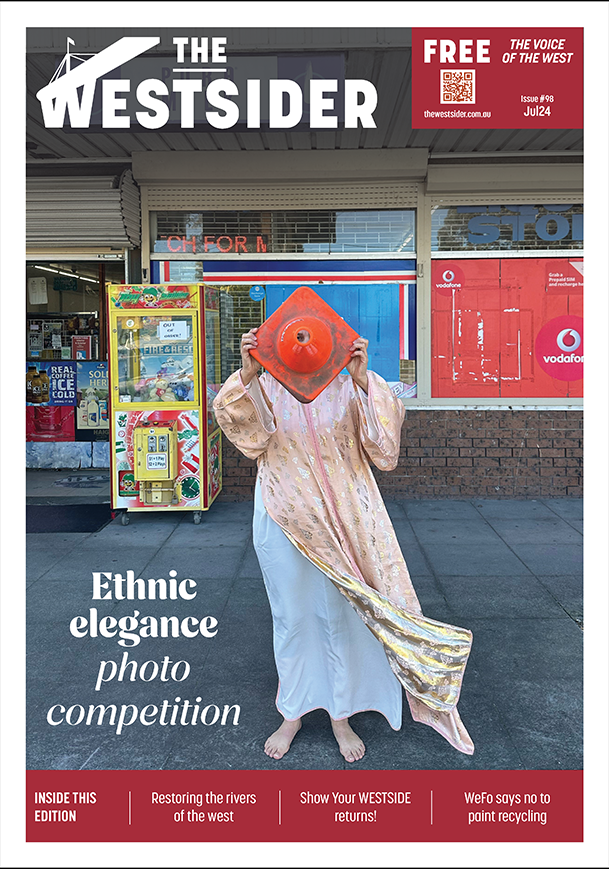By Kel Rowe
With the occasion of the recent AFLW draft, it’s a fantastic reminder that young girls can play the sport they love at the top level. The introduction of the AFLW has changed the landscape of footy across Australia for the better, but its impact isn’t just playing out in the form of a pathway from junior footy to the national stage.
Women’s footy has existed in Victoria for over a century— the first recorded match played out in Ballarat in 1918 — but today, many women are only just realising the opportunity to pick up a Sherrin and get involved in their local footy communities.
The Western Region Football League (WRFL) is just one of many Victorian leagues offering women and non-binary people a space to engage in the sport. The league officially launched its current stand-alone Women’s competition in 2018 and have since seen it grow into two divisions and 14 teams.
Across the West, weekend after weekend, these suburban women and non-binary folk proudly don their team colours to run out 4 quarters of solid, rough and tumble footy. Mothers and daughters, friends and family, complete strangers — people from all walks of life — brought together by their love of the game.
A chance never had, now realised
If you speak with the players, many will offer that they have spent plenty of time supporting from the sidelines — playing the roles of “the daughter of a footballer, the sister of a footballer, the girlfriend of a footballer, a mum of a footballer”. Unsurprisingly, all jumped at the opportunity to be a footballer when it presented.
AFL Census data reveals participation amongst women and girls at community footy level has surged twelvefold in the last decade, with 2,540 teams registered across Australia in 2019. While senior women’s footy starts at 16+ years of age, many participants have come to the sport as adults, having little to no experience playing the game in their childhood. But it hasn’t stopped their enthusiasm.
These players are savouring their chance to finally play footy, building community and a sense of belonging in a space that for so long hasn’t been open to them. Confidence and camaraderie grow with each training session; and teammates form lifelong friendships as they battle together in the mud and cold that each footy season brings. Reluctant to take the joy for granted, some even play each game like it could be their last.
The mental and physical benefits
Results from the AusPlay Survey, a national survey led by Sport Australia, identified that 67.1% of women (15+ years) participate “at least 3 times per week in sport and physical activities”. When it comes to Aussie Rules, survey participants highlighted “Fun/enjoyment”, “Social reasons” and “Physical health or fitness” as key motivators to get involved.
Mirroring these stats, most local footy teams train twice a week and play a game on the weekend. Whilst it may seem like a fair commitment, those who have embraced the sport agree its fun and friendly atmosphere makes moving the body an easy task. Footy provides a healthy outlet for exercise and wellbeing, helping to build confidence, resilience and leadership — on and off the field.
Players are often drawn to join their local footy clubs through family and friends, and many credit the strong culture and community evident in women’s teams as to what keeps them coming back. It’s this welcoming, community vibe, that has also allowed many players to feel comfortable and safe to express their own identities.
A sense of belonging and community
By virtue of its position on the outer, women’s footy has long been an inclusive space, a grassroots movement celebrating difference in all facets of life. Not only are women and non-binary players experiencing a sense of belonging in a space formerly reserved for men, but they are embraced and supported by their peers.
Race, religion, gender identity and sexual orientation are celebrated openly — fasts are broken together at Iftars during Ramadan, First Nations stories are told through Indigenous guernseys, and Pride Rounds are played as a signal that the game belongs to all.
At a local level, the inclusive nature of women’s footy means a great deal to the health and wellbeing of its players. Beyond Blue lauds the benefits of team sport, with human connection and support networks, team work, and building resilience all contributing to improved mental health outcomes. Many players find playing footy leads to increased comfort and confidence in their own skin — through the benefits of regular exercise, but also a supportive team environment that encourages them to thrive.
As one of the fastest growing sectors of the sport, there is a lot to like about Women’s Footy.
So, if you’ve ever considered throwing on the boots, you haven’t missed the boat. It’s never too late. Get down to your local Western Region Football League club — we’ll be there waiting for a kick.

